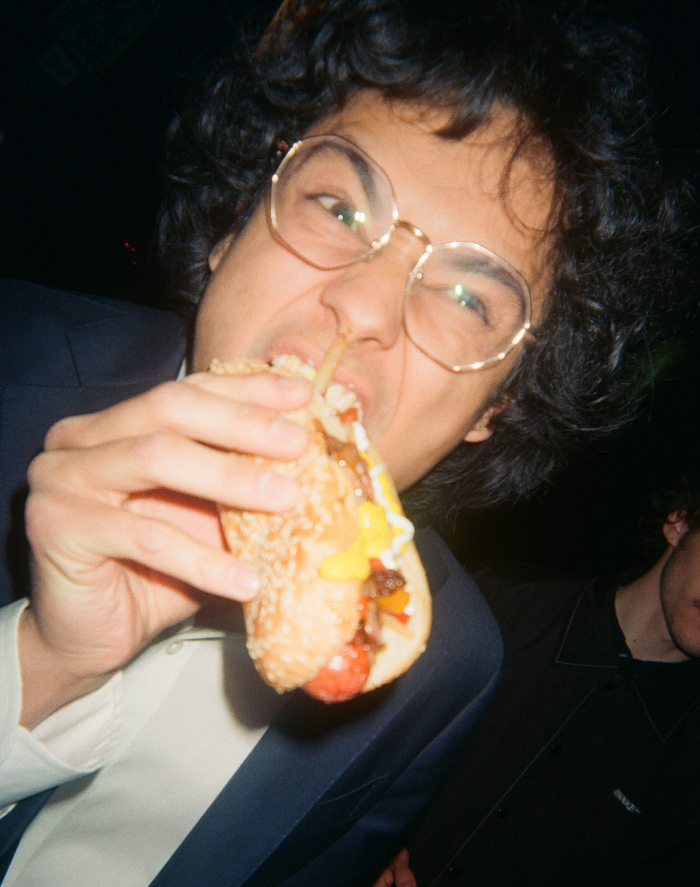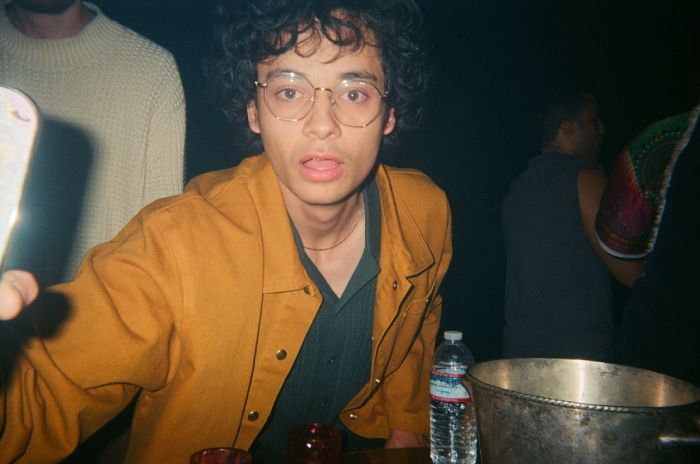Nick Green has a problem staying unplugged.
“I’m pretty bad at it,” the 23-year old content creator admits, “It’s really just me putting too much into work; it’s this balance that I haven’t been able to totally figure out since starting this job, especially in the side of YouTube that I’m in right now, it’s very community-centered.”
Green, who has been uploading content to the site since April 2021, has been steadily gaining a following of 627,000 subscribers as nickisnotgreen (which doesn’t include his other channels, greenisnotnick, nickisnotgaming, or hesaidus) and follows a similar trend in terms of video creation; he’s tackled everything from controversial figures like Andrew Tate to more light-hearted topics like interviewing “water influencers.” Green mixes in more personal content, too, introducing his viewers to his beloved cat and even describing his own mental health struggles. He’s like some Gen Z version of Jon Stewart — quick witted snark and all.
His channel falls under the commentary genre, a niche YouTube subculture that up until recently was typically composed of young-ish white dudes covering a range of topics, from cracking jokes about low-budget movies to biting social commentary. Collaborations with other creators happen on the regular — and it’s not unusual for these YouTubers to become real-life friends. The line between life online and offline can be increasingly blurred for content creators like Green. “That part is tough to navigate because it’s frustrating to find space away from talking about work with people versus getting to live in the real world, and experience things,” he explains. “When I lock myself inside for months and just try to work as much as I can, I become uninspired, so it’s just a cycle of constantly trying to figure it out.”
There’s a youthful excitement to the way Green talks about his content-making, which tracks since he’s relatively new to the scene. But, the internet is fickle and constantly changing; Green always has to be ready to readjust. When he first started uploading onto YouTube, the commentary genre was overwhelmingly made up of white men (many of whom are his friends), with popular creators being Cody Ko, Drew Gooden and Kurtis Conner, to name a few. This led to the “White guys talking about films,” (as Green himself puts it), reputation the genre garnered.
He finds that this is an inclusivity issue that YouTube has faced historically, with the bigger names on the platform being PewDiePie, Mr. Beast, and even the Green Brothers (no relation to the Green being interviewed) “YouTube’s built on this history of consumers that didn’t have representation for themselves, growing up and watching YouTube [and] going into the commentary space, especially in seeing that there was a want and a need from myself and a lot of people to have voices in the space,” He explains. “That’s not to say the people on YouTube before don’t deserve it, or were not very talented entertainers who helped me get to where I am.”

While there are plenty of YouTubers decorating the hallowed halls of the trending page, one held a special place in Green’s childhood. Especially when it came to portraying a group that is often ignored in the wider entertainment landscape. “Ryan Higa was the G.O.A.T (Greatest of All Time) for me. He has done a good job of acknowledging his place in that culture and also how he can grow from it. He cultivated a really great space on YouTube that isn’t seen as, ‘Oh, this guy’s whole deal isn’t that he’s Asian,’” Green says. “It’s that he’s great at writing comedy sketches and knows how to appeal to his audience, which I think was really big for me as a kid.”
Having grown up on YouTube, Green is acutely aware of the challenges of social media. The distance between consumer and creator has never been this close. Between Instagram, Twitch, Twitter, and endless other social media platforms, viewers can stay tuned in to their favorite e-celebs with ease. This phenomenon can lead to parasocial relationships, where due to the constant connection, fans may feel an intense relationship with the creator who has no idea of their existence. Green, whose content can cover personal topics as aforementioned, knows that this is new territory even for the YouTubers themselves.
“We haven’t really experienced anything like this before, so it’s hard initially jumping into that job to figure out the best way to communicate with people in a way that doesn’t make yourself too attached to them,” he says. “But there’s a sense that [relatability] is what people enjoy, and part of my job is connected to my real life as a person. If it’s something that helps you make the content you want, and it makes you feel more comfortable putting out things with people knowing the context behind your life, then I do think there are good ways to do it.”
Outside of his YouTube videos, Green has been slowly but surely dipping his toes into other avenues. Music has been an integral part of his content creation career, with him dropping songs since 2019 under the names Denton, Queef Jerky, (a collab with fellow YouTuber Dev Lemons,) and most recently, a single titled “Timebomb” released under his given name, Nick Green.
“I am always open to thinking about different creative endeavors. I’ve always been interested in doing voice acting…and obviously [I’ve] been interested in music,” says Green, though he doesn’t see himself losing interest in what got him here in the first place. “As my career goes, I don’t know if YouTube is ever going to be something that I fully leave behind.”
But Green isn’t too concerned about what’s outside of Youtube. He’s still learning what works for him personally in terms of content creation. Recently, he took a break from uploading to reevaluate his whole process, and while the kinks are still working themselves out, one thing continues to remain a focal point for Green: to help create a space for a more diverse group of voices in the commentary sphere.
“In spite of trying to figure out what my content is,” Green said.”I always want to connect with people and try to push forward a larger feeling of community.”








